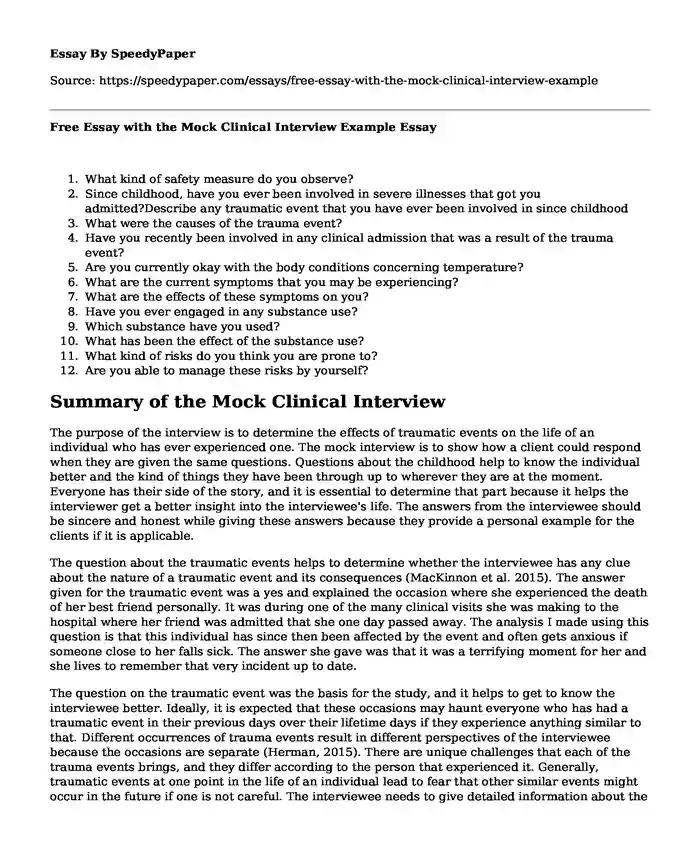
| Type of paper: | Essay |
| Categories: | Post traumatic stress disorder |
| Pages: | 4 |
| Wordcount: | 843 words |
- What kind of safety measure do you observe?
- Since childhood, have you ever been involved in severe illnesses that got you admitted?Describe any traumatic event that you have ever been involved in since childhood
- What were the causes of the trauma event?
- Have you recently been involved in any clinical admission that was a result of the trauma event?
- Are you currently okay with the body conditions concerning temperature?
- What are the current symptoms that you may be experiencing?
- What are the effects of these symptoms on you?
- Have you ever engaged in any substance use?
- Which substance have you used?
- What has been the effect of the substance use?
- What kind of risks do you think you are prone to?
- Are you able to manage these risks by yourself?
Summary of the Mock Clinical Interview
The purpose of the interview is to determine the effects of traumatic events on the life of an individual who has ever experienced one. The mock interview is to show how a client could respond when they are given the same questions. Questions about the childhood help to know the individual better and the kind of things they have been through up to wherever they are at the moment. Everyone has their side of the story, and it is essential to determine that part because it helps the interviewer get a better insight into the interviewee's life. The answers from the interviewee should be sincere and honest while giving these answers because they provide a personal example for the clients if it is applicable.
The question about the traumatic events helps to determine whether the interviewee has any clue about the nature of a traumatic event and its consequences (MacKinnon et al. 2015). The answer given for the traumatic event was a yes and explained the occasion where she experienced the death of her best friend personally. It was during one of the many clinical visits she was making to the hospital where her friend was admitted that she one day passed away. The analysis I made using this question is that this individual has since then been affected by the event and often gets anxious if someone close to her falls sick. The answer she gave was that it was a terrifying moment for her and she lives to remember that very incident up to date.
The question on the traumatic event was the basis for the study, and it helps to get to know the interviewee better. Ideally, it is expected that these occasions may haunt everyone who has had a traumatic event in their previous days over their lifetime days if they experience anything similar to that. Different occurrences of trauma events result in different perspectives of the interviewee because the occasions are separate (Herman, 2015). There are unique challenges that each of the trauma events brings, and they differ according to the person that experienced it. Generally, traumatic events at one point in the life of an individual lead to fear that other similar events might occur in the future if one is not careful. The interviewee needs to give detailed information about the traumatic event and the symptoms they have been experiencing since then.
The question about substance use is to identify whether the client knows anything about their condition about the trauma event and if they have been doing anything to avoid instances of remembering. The question dramatically helps to gauge the understanding of the client about the complex nature of the trauma event and the human side of the fact (First et al. 2002). The client requires to state they substance they have been using and also describe the relief they get after such use. My mock interviewee said that they do not use any substance and they tend to deal with the condition on their own. It is such a big challenge for them because the event was a huge burden to carry. Talking about past experiences helps to get a comprehensive report of what the patient may be having troubles with, and it eases the process of clinical analysis.
Assessment for clinical conditions of a patient that may have had a traumatic event helps a psychologist to make a secure diagnosis for the patient and treat them accordingly. I also noticed that there are essential elements that an interviewer should put into consideration and these include the fact that the environment needs to be conducive to share information, questions need to be open-ended, and they need to give attention to messages delivered verbally and non-verbally. The mock clinical interview was a huge success such that one knows what they are to expect from the clients.
References
First, M. B., Spitzer, R. L., Gibbon, M., & Williams, J. B. (2002). Structured clinical interview for DSM-IV-TR axis I disorders, research version, patient edition. SCID-I/P.
Herman, J. L. (2015). Trauma and recovery: The aftermath of violence--from domestic abuse to political terror. Hachette UK.
MacKinnon, R. A., Michels, R., & Buckley, P. J. (2015). The psychiatric interview in clinical practice. American Psychiatric Pub.
Cite this page
Free Essay with the Mock Clinical Interview Example. (2022, Sep 07). Retrieved from https://speedypaper.com/essays/free-essay-with-the-mock-clinical-interview-example
Request Removal
If you are the original author of this essay and no longer wish to have it published on the SpeedyPaper website, please click below to request its removal:
- Historical Essay Sample: Rwandan Genocide Facts
- Free Essay: Technology and Its Impact on Business Decisions
- Haleema's Personality, Free Essay on Child Development
- Essay Sample about Publix Supermarket's Marketing Strategy
- Essay Sample on Obesity, Hyperlipidemia, Hypertension, and Type 2 Diabetes
- Free Essay about the Role of the Executive in Arms Export Policy
- War, Trade, and Empire
Popular categories




